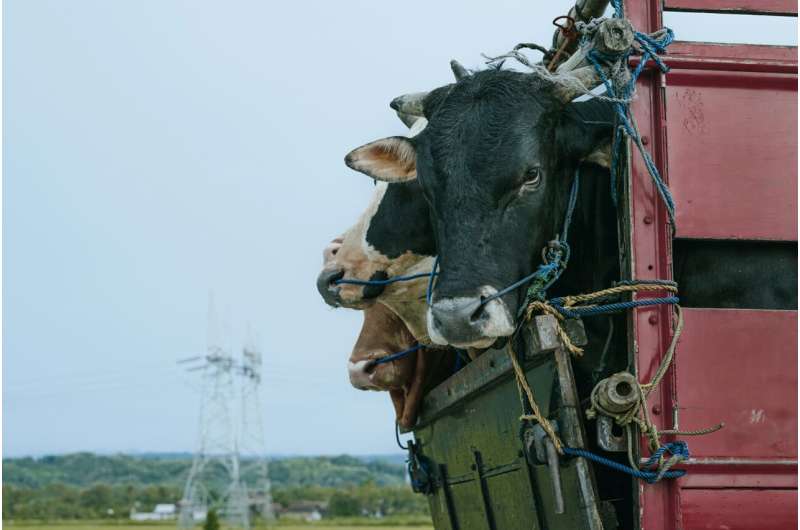
A “fitness check” of regulations in five countries, meant to protect animals during transportation, has deemed that they all fall short of fully protecting animals during transport. Findings from this interdisciplinary work involving animal welfare scientists and a law lecturer which compared animal transport rules designed to protect the billions of livestock that are transported on lengthy journeys—within Australia, Canada, New Zealand, EU (including the UK) and the US—highlight serious failures.
The study, published in Royal Society Open Science, and involving researchers from the Universities of Bristol, Essex and British Columbia (Canada), is the first comprehensive fitness check of live animal transportation regulations in five English-speaking Western countries to assess whether the regulatory framework for a policy sector is fit for purpose.
Live animal transport, which affects most farm animals at some point during their lifetime, is a stressful experience whereby animals are often subjected to long transport times during which they are prevented from drinking, eating and resting. For example, in Canada some animals can be transported for 36 hours without feed, water and rest.
Researchers investigated four major risk factors associated with live animal transportation—fitness for transport, journey duration, climatic conditions and space allowances—and explored how regulations were structured to prevent animal welfare issues.
Results from this research showed that all countries could improve and draw key future directions for new policies. For instance, no countries adopt maximum journey duration for all animals, meaning that animals can sometimes be transported for days. Not all countries mandate regular rest stops for long journeys, but those that do often mandate rest stop times that are too short to allow meaningful recovery.
Updating the transport regulations using the most recent science would be an important step towards improved animal welfare during transport, bringing the livestock industries more in line with societal values.
The team also considered recent and proposed changes to the regulations. These included reviewed changes that have been announced but not yet been translated into legislation or different options that are being considered. For instance, in December 2023, a bill including a ban on the export of livestock for slaughter and fattening from Great Britain (i.e., England, Scotland and Wales, but not Northern Ireland) was introduced in Parliament, but may only target a minority of animals being exported.
Dr. Ben Lecorps, study co-author and Animal Welfare Lecturer in the Bristol Veterinary School, said, “Our findings indicate that regulations are often insufficient or too vague to ensure they are fit for purpose. All studied countries fall short in guaranteeing adequate protection to livestock during transport. Whilst this does not mean that all animals transported will experience serious harms, major risk factors such as excessively long journeys, or journeys during hot weather, are not being addressed to a satisfactory level.”
Dr. Eugénie Duval, study co-author and Lecturer in Law at the Essex Law School, added, “Even if they do not necessarily reflect the latest scientific evidence, some regulations are more specific than others.
“If we were to take the best from each regulatory framework (e.g. fitness for transport in Canada; providing species-specific thresholds for the temperature inside vehicles in the EU) and apply some of the propositions made by some countries (e.g. a ban of export outside the EU borders: proposition of some EU Member States), the ensuing regulations would be a major step closer to safeguarding animal welfare during transportation.”
More information:
Are regulations addressing farm animal welfare issues during live transportation fit for purpose? A multi-country jurisdictional check, Royal Society Open Science (2024). DOI: 10.1098/rsos.231072. royalsocietypublishing.org/doi/10.1098/rsos.231072
Citation:
Live animal transport regulations not ‘fit for purpose,’ large international study finds (2024, January 23)
retrieved 23 January 2024
from https://phys.org/news/2024-01-animal-purpose-large-international.html
This document is subject to copyright. Apart from any fair dealing for the purpose of private study or research, no
part may be reproduced without the written permission. The content is provided for information purposes only.







